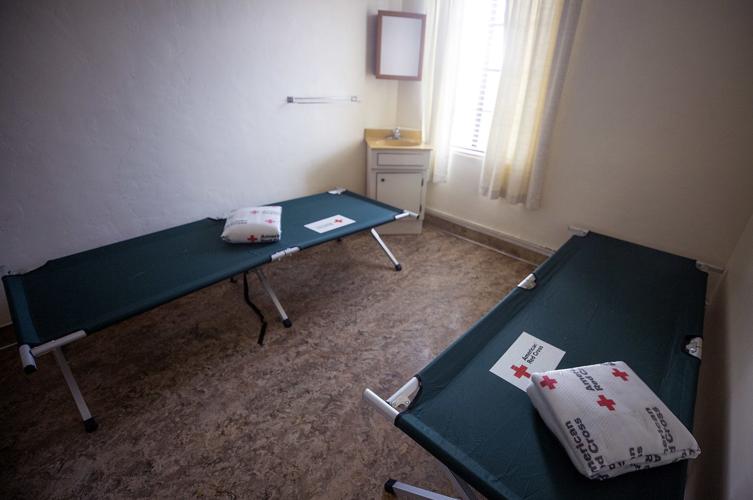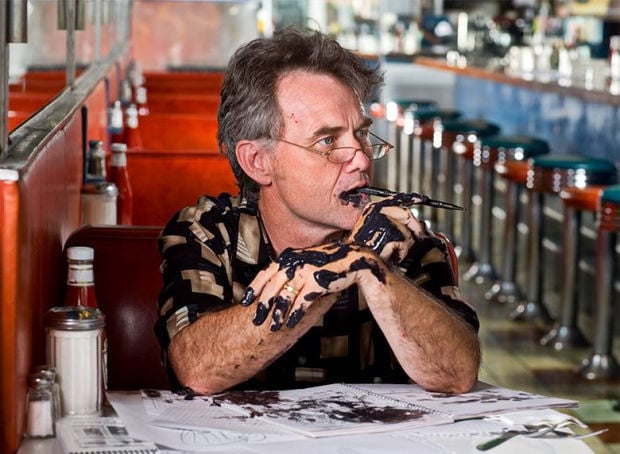I met Teresa Cavendish, director of operations from Catholic Community Services of Southern Arizona, out back, behind the Benedictine Monastery on Country Club.
Since 2014, Casa Alitas has served over 6,000 souls, working out of bus stations, classrooms, group homes, hotels and now at the old monastery, sending refugees on their way to the custody of their sponsors. Casa Alitas means House of Little Wings.
The Immigration and Customs Enforcement van arrives. Teresa alerts a volunteer to come out and greet the new refugees. Two agents step out and greet Teresa. One opens the side door.
Families emerge and gather in front of Sister Eileen Mahoney who has come out to greet them.
Some smile. Most are anxious, holding on to their children. Tight. They appear innocent, naive and weary. Women wear their black hair in ponytails, held in place by tinfoil strips which they tore from the tinfoil blankets they were given when their hair ties were confiscated. Shoelaces, too.
Each has their worldly belongings in a large clear Ziploc bag with their name on it. I thought of the storage sheds we fill with excess abundance. I’m staring because I cannot imagine my world distilled into a bag. Their clothes and laceless shoes are worn but clean. They carry their dignity on their shoulders. Their vulnerability in their hearts.
If you feel your job is threatened by these simple souls, I pity your pathetic insecurity. If you fear these innocents, I pity you for your cowardice. If you hate them, I pity you for your ignorance.
The refugee families are welcomed by Sister Mahoney. “Esta su casa.” They see the sanctuary. They are collectively relieved. One young man sees refugee children playing among the trees. He quietly asks Sister Mahoney, “Libre?”
Sister Mahoney smiles. “Yes. Libre. We are not the Government. This is a place of safety. And hope.”
You will get a health check and a warm meal. We’ll check your documentation. You can call your sponsor. We will help you get to your hearing. You will have a safe place to sleep. Sister directs them inside.
As a dad politely answers his intake counselor, his tiny daughter, wearing pigtails bound with tinfoil, colors superheros in a coloring book. I study her tiny shoes. Shoes that have carried this child across deserts, jungles and mountains. So worn. I think of my granddaughter. She has a closet full of shoes.
I eavesdrop on volunteers.
“Someone slashed the tires of some of the volunteers’ cars the other night.”
“What happened to that 80-year-old woman from Guatemala? Can you believe she made it all this way by herself?”
“And then to Homestead, Florida!”
A sunny clothing bank volunteer tells me he enjoys finding “the warmest coats” among the racks. For refugees heading to cold climates. “It’s the only coat they’ll own.” I remember a Sunday school lesson in my past. One most of us have forgotten.
Pediatrician Dr. Richard Wahl says, “I’ve been involved since October.” Wahl points to Teresa and says, “This woman shows up at my synagogue. Tells the story. I’m blown away.”
They laugh.
“I’ve lived here since ’85. When I came here the first time I saw this a special place. Tucson is responding in ways that many cities do not.”
True. In other communities such souls are simply abandoned by ICE at bus stations. Dr. Wahl has an email list of 140 medical colleagues he calls on when help is needed. He’s heartened by the generosity and kindness of his colleagues. Just ask and ye shall receive.
Volunteer Kristin Helland has a theory. “Being on the border in a multicultural place … it opens people’s hearts. It’s amazing. They trained 200 volunteers in about a week.”
In less than three weeks they have helped over 600 refugees to their final destination. Teresa tells me, “We only take families. We have 50 rooms. We only had one exception. A single man from Honduras. One eye gouged out. Both arms hacked off above the elbows. Because he refused to sell drugs. Santos. He sang hymns. Beautifully.” Another volunteer nods.
A petite young mother from Guatemala watches her boys play outside. They’re heading to Atlanta to work on a peach farm. They walked across Mexico, spent 12 days in a detention center and when I ask her what she hopes for she looks at me like I’m a very silly man as she looks to her children. I’m asking her to state the obvious.
A little boy on a tricycle races toward me. “Knuckle blast,” I say. He holds out his tiny fist. Our knuckles meet, our hands fly back in a mock explosion and he smiles.
It took one father and his 16-year-old son 15 days to walk across Mexico. I can’t get my teenager to walk around the block with me. Near the border they were robbed by bandits. Penniless, they joined a group of 300 who crossed at San Luis where they were picked up. They spent the last seven days sleeping on the floor of a detention center before coming here. Here the gangs can’t threaten to kill him and his son if he doesn’t pay.
Another soul’s mother, and son, were decapitated in front of him. Teresa says, “We’re here because we don’t want to be part of what these folks are running from. Fear and anger.”
Another van arrives. Back outside, a joyful young woman, Ali Hofer, cheerfully greets the newest arrivals. She instructs them, comforts them, and shepherds them inside. Why is she here? “I’m with the Jesuit Volunteer Corps.” She smiles. “Sort of like AmeriCorps for Catholics.”
I’m in awe of this selfless beatific kid. What about the desperation she sees? “It can be overwhelming. Heartbreaking. You can’t help everybody. If I help one person it’s a victory.”
Why do this? She turns to her flock. “It’s the right thing to do.”





